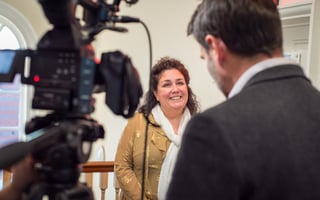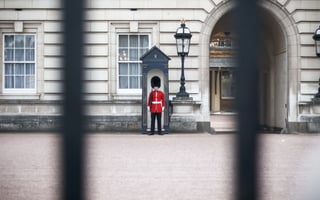Have you ever wondered exactly what you would learn on a media training course?
Criticising the journalist. Complaining about tough questions. And walking out before it ended.
It’s no wonder that Donald Trump’s 60 Minutes interview has been dominating the news.
And with so many media training lessons on display, it was one that we couldn’t ignore.
The president not only produced a masterclass in how not to deal with a challenging interview but even managed to find a way to make it worse after the cameras had stopped filming.
Let’s start with the interview itself.
It was an interview that started going wrong before it got started. As the interview was about to start, Mr Trump seemed to take offence when he was asked by presenter Lesley Stahl whether he was “ready for some tough questions.”
A gentle enough introduction to proceedings you would think, but it seemed to cause some problems for the president. He initially asked the journalist whether she would be “fair”, before suggesting that he wasn’t ok with difficult questions.
And this was to become a theme when the interview started properly, with Mr Trump becoming increasingly fixated on the idea he is given a harder time in interviews than his rival Joe Biden.
And this led him to criticise the journalist, claiming that challenging issues were “inappropriately brought up.”
He complained: “They were inappropriately brought up. Right from the beginning. No, your first question was, 'This is going to be tough questions.' You don't ask Joe Biden, I saw your interview with Joe, the interview with Joe Biden.”
When Ms Stahl added that she hadn’t interviewed Joe Biden, Mr Trump said: “It was a joke. The interview, 60 Minutes. I see Joe Biden, giving softball after softball. I've seen all of his interviews. He's never been asked a question that's hard.”
And he then suggested Ms Stahl has set out to get an “angry” interview and revisited her opening remark about “tough questions” saying "that's no way to talk. That's no way to talk."
When a producer interrupted proceedings to advise about the time remaining time for the pre-recorded interview, Mr Trump decided he’d had enough.
He said: I think we have enough of an interview here, Hope. Okay? (appearing to get the advice of aide Hope Hicks). That's enough. Let's go. Let's go. Let's go meet for two seconds, okay? Thanks. I'll see you in a little while. Thanks.”
And with that he left, leaving a bemused Ms Stahl to say: “I've got a lot of questions I didn't ask.”
If that wasn’t bad enough, he didn’t return for a pre-arranged additional segment with vice president Mike Pence.
If you’re a regular reader of this media training blog, you’ll know this interview breaks a lot of golden rules for dealing with difficult interviews.
When the going gets tough, you have to retain your composure. Showing frustration and annoyance and criticising the journalist and their questions ensures an interview will be memorable for the wrong reasons.
Even if your interview is going badly, or you feel the questions are unfair, walking away must be avoided. It is the ultimate display of annoyance in an interview and something that rarely happens. So, when it does, it propels an interview into the ‘must-see’ category – A president walking out of a 60 Minute interview will go down in the show’s folklore.
The other bit that fascinates me about the interview, is why Mr Trump was surprised he was going to be asked tough questions – not that he was asked anything more than to defend his performance over the past four years.
Was he expecting a soft pre-election promotional piece?
It makes you wonder whether he had researched the programme he was appearing on and the journalist who would be asking the questions – something we tell our media training delegates is an essential part of their preparation.
What happened after the interview is as interesting as the president’s performance.
The White House decided to release its unedited video version of the interview on Mr Trump’s Facebook account before the programme was due to be aired.
Look at the bias, hatred and rudeness on behalf of 60 Minutes and CBS. Tonight’s anchor, Kristen Welker, is far worse! #MAGA https://t.co/ETDJzMQg8X
— Donald J. Trump (@realDonaldTrump) October 22, 2020
Maybe this was done out of spite. Maybe it was an attempt to control the story and take the air out of it. But all it achieved was to build the hype and bring more attention to the interview, and his poor performance – he still came across as being defensive and whiny in his footage.
While the station, CBS, put out a statement calling the decision to release the footage “unprecedented” it must have quietly been delighted by the president doing the PR work for the show and turning it into television that could not be missed.
CBS News statement on @60Minutes interview with President Trump pic.twitter.com/Ivz9NBiU6r
— CBS News (@CBSNews) October 22, 2020
The episode attracted 17 million viewers for CBS, making it the most-watched non-sports-related television program since the Oscars in February. It also drew a bigger audience than that evening's American Football match.
Those who tuned in to the programme saw Ms Stahl introduce the interview as one that ended “contentiously.”
She said: “We had prepared to talk about the many issues and questions facing the president, but in what has become an all-too-public dust-up, the conversation was cut short.
“It began politely, but ended regrettably, contentiously.”
They also saw what happened after Trump walked away from ‘tough’ questions. Kayleigh McEnany, the White House press secretary, entered the interview with a large folder she described as Mr Trump’s long-awaited “health care plan” - something that was later to unravel.
When the journalist asked Ms McEnany whether the president is coming back, she was told: “The president's given you a lot of time.”
It was all pretty untidy, and when Mr Pence was also asked about the president’s disappearance – during a section Mr Trump should have been part of – he said he’s “not interested in a back and forth with the media.”
Of course, there will be those loyal supporters who will lap up the president’s claims the interview is more evidence of him being the victim of “fake news” and a “biased” media – a narrative that continues to be constantly pursued.
But everyone else will surely see it for what it was – a disastrous media interview, even by the standards of someone who has regularly broken media training rules.
Media First are media and communications training specialists with over 35 years of experience. We have a team of trainers, each with decades of experience working as journalists, presenters, communications coaches and media trainers.
Subscribe here to be among the first to receive our blog.




